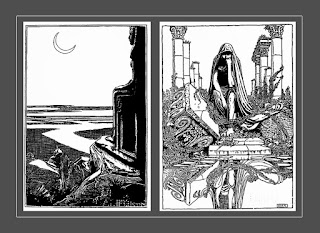Once upon a midnight dreary—how I found Poe
When I was 14 years old, I caught a late-night TV airing of The Raven (1963), starring Vincent Price, Boris Karloff, Peter
Lorre, Jack Nicholson and Hazel Court.
This was a period in my life when I had carved out a niche alone and
away from the world, when I would binge-watch classic horror movies, stay up
for lunar eclipses, and generally engage in mysterious, anti-social behavior—like any normal teen!
Four years before, I had arrived in the United States from
El Salvador and I hadn’t yet figured out exactly where or how to fit in, so I
had created this space at the margins of American culture. The Roger Corman flick is a campy,
B-horror yarn: “That motley drama—oh, be
sure It shall not be forgot!” I am
sure that I got sleepy as the storyline progressed, and I barely remember that
final, over-the-top battle-of-the-wizards finale. But what grabbed me and I always remembered was
the opening sequence in which Vincent Price recites “The Raven.”
The next day, I ran to the library and borrowed The Works of Edgar Allan Poe, and kept
it checked out on extended loan while I devoured poem after poem, story after
story. The resonance with this author
was immediate, profound, and, as it would turn out, very enduring. But why
would a 19th Century American poet appeal to a Salvadoran refugee kid living in New
York’s inner city in the early 1980s?
The attraction worked on many levels. On the surface, Poe’s
works appealed directly to my interest at the time in gothic horror, which, in
turn, struck a deep cultural chord with the folklore from my childhood growing up in
El Salvador, a land every bit as enchanted as the Gypsy country of Wallachia
and Carpathia in Bram Stoker’s Dracula. Although Poe is more Dark Romantic than Gothic,
the similarity between his oeuvre and
the occult, supernatural, and science-fiction genres of my fancy at the time made
his work seem coextensive with my interests.
Just as important, however, I think was Poe’s unmistakable
outsider worldview. Here is a man who is
living outside society, and he isn’t even
trying to fit in. He wears his
outsider status as a badge of honor, and revels in cataloguing all that sets
him apart. This is the same reason, I suspect, why the French were first to
embrace him—he has very universal misfit and nonconformist appeal.
He struggles financially all of his years, his family life is in shambles,
and he is misunderstood by everyone. In
other words, he was just like me!
Additionally, Poe’s adolescent Weltanschauung made him
absolutely relatable to the 14-year-old me.
Poe’s love life is continually unfulfilling, either because he loses
interest, or the relationships never mature beyond the platonic, or when they
do, they’re asexual or the women exit his life (usually, because they
die). Again, this was the dorky teenage
me (okay, minus the dying women).
Moreover, as a teen who was still learning English, the
musicality and lyricism of Poe’s poetry drew me in and made me fall in love
with my new, adoptive language in ways that nothing else had, up to that moment. Years later, when I read Shakespeare, I would
have a similar reaction to the elegance of expression in Shakespeare’s verse,
but before I discovered Shakespeare, that function was fulfilled by Poe.
Finally, a byproduct of this effect—the fascination with the
melodic, spellbinding beauty of Poe’s verse—was that I would retain it as
something permanently imprinted on my brain.
Therefore, many years later, I would find myself riding a subway and
hearing the drone rumble of the metal wheels over the rails I would suddenly
conjure in my head the meter of “Song from ‘Al Aaraaf’,” and automatically flash back to stanza after stanza of a poem
I had not read in decades.
Today, I read Poe’s poems like comfort food for the soul,
and when I try to understand Poe and where he was coming from, I am also trying
to reconstruct that part of me that
gravitated toward his work so irresistibly “once upon a midnight dreary” in my teenage years.
I quest for the Poe who moves in folklore and personalized mythogenesis, I seek
for Poe the outsider, and Poe the adolescent, and Poe the original freestyle
beat-boxer. I seek for the American Bard.




Comments
Post a Comment